Xi's anti-poverty footprints in ethnic minority areas
During his inspection trip in northwest China's Ningxia Hui Autonomous Region this week, President Xi Jinping said no single ethnic minority group should be left behind in the country's building of a moderately prosperous society in all respects.
During his inspection trip in northwest China's Ningxia Hui Autonomous Region this week, President Xi Jinping said no single ethnic minority group should be left behind in the country's building of a moderately prosperous society in all respects.
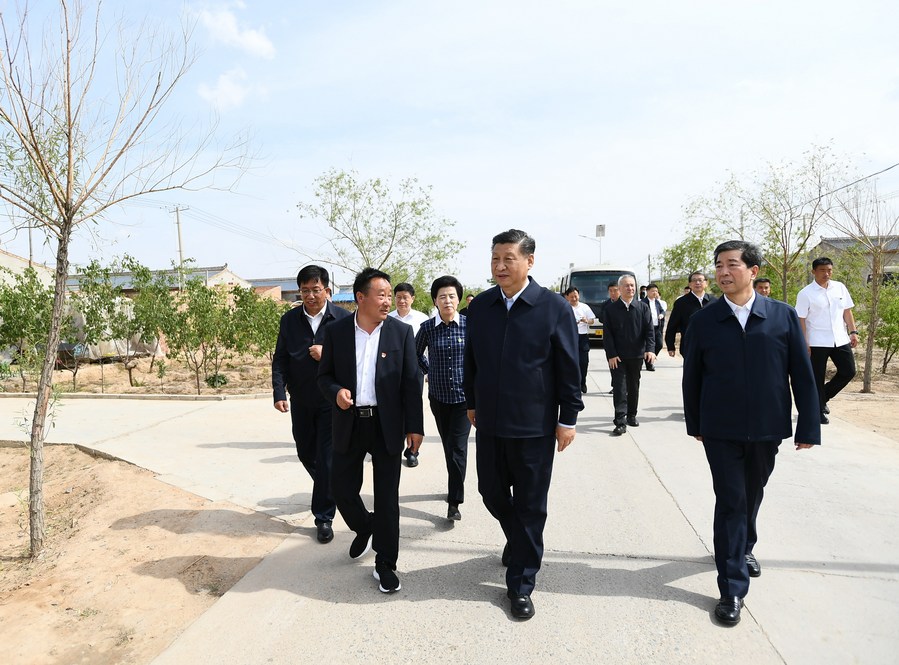
Chinese President Xi Jinping, also general secretary of the Communist Party of China Central Committee and chairman of the Central Military Commission, learns about efforts to advance poverty alleviation in Hongde Village of Wuzhong City, northwest China's Ningxia Hui Autonomous Region, June 8, 2020. Xi inspected Ningxia on Monday. [Photo/Xinhua]
The promise means a great deal for China, a country with 56 ethnic groups.
Over the years, Xi, also general secretary of the Communist Party of China (CPC) Central Committee and chairman of the Central Military Commission, has paid close attention to the cause and made several visits to ethnic minority areas.
The following are the highlights of several such visits made by Xi over the past three years.
Ningxia, June 2020
During the inspection in Ningxia, Xi visited a relocated village and a residential community in the city of Wuzhong to learn about efforts to advance poverty alleviation and promote ethnic unity.
At the house of Liu Kerui, a villager of the Hui ethnic group, Xi took a good look at the courtyard, living room, bedrooms, kitchen and cowshed, asking Liu and his wife if they had any difficulties and what they planned for the future.
Visiting the Jinhuayuan residential community, where people from several ethnic groups live together, Xi said no single ethnic minority group should be left behind in the country's building of a moderately prosperous society in all respects.
It represents the fine tradition of the Chinese nation and the great strength of the socialist system with Chinese characteristics to enable people of all ethnic groups to walk hand in hand into a moderately prosperous society in all respects, Xi added.
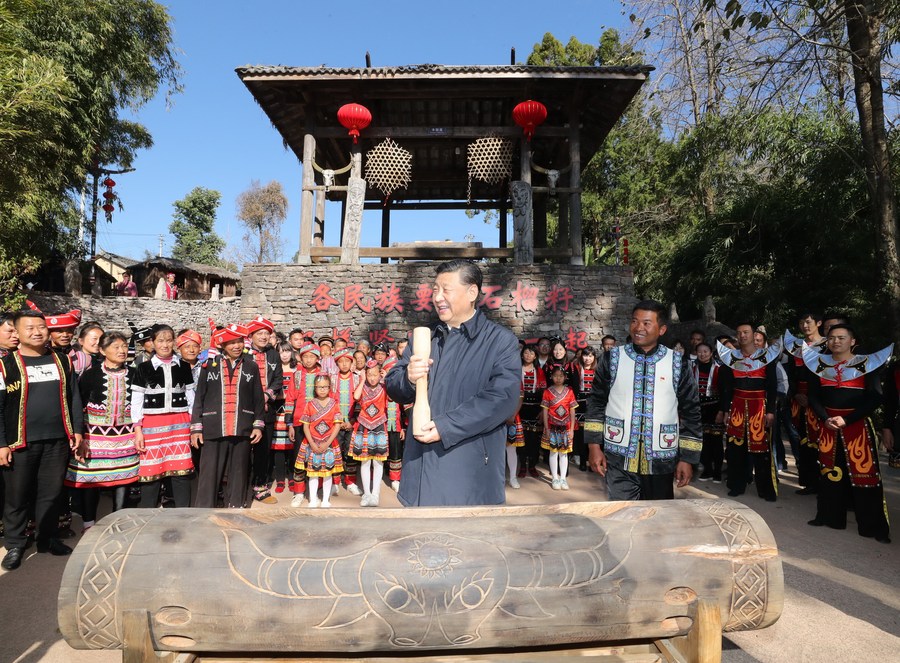
Chinese President Xi Jinping, also general secretary of the Communist Party of China Central Committee and chairman of the Central Military Commission, beats a wooden drum of the Wa ethnic group three times to bless the coming year in Sanjia Village in the city of Tengchong, southwest China's Yunnan Province, Jan. 19, 2020. [Photo/Xinhua]
Yunnan, January 2020
During a visit to Sanjia Village in the city of Tengchong, shortly before the Lunar New Year, Xi learned about poverty alleviation and called for efforts to speed up the development of ethnic minorities and those areas with large ethnic-minority populations.
Xi then walked into pig farmer Li Fashun's house in Simola Wa Village, asked about the price of pigs and the family's income, checked their kitchen, and then joined the family in making rice cakes, a traditional Wa way of ringing in the new year.
Talking to Li's fellow villagers, Xi said that, after China achieves building a moderately prosperous society in all respects, it must make all-out efforts to advance rural vitalization to further address issues such as the urban-rural imbalance.
He said rural industries will be boosted, as well as the rural economy, to allow more and more villagers to work near home, increase their incomes and lead a better life.
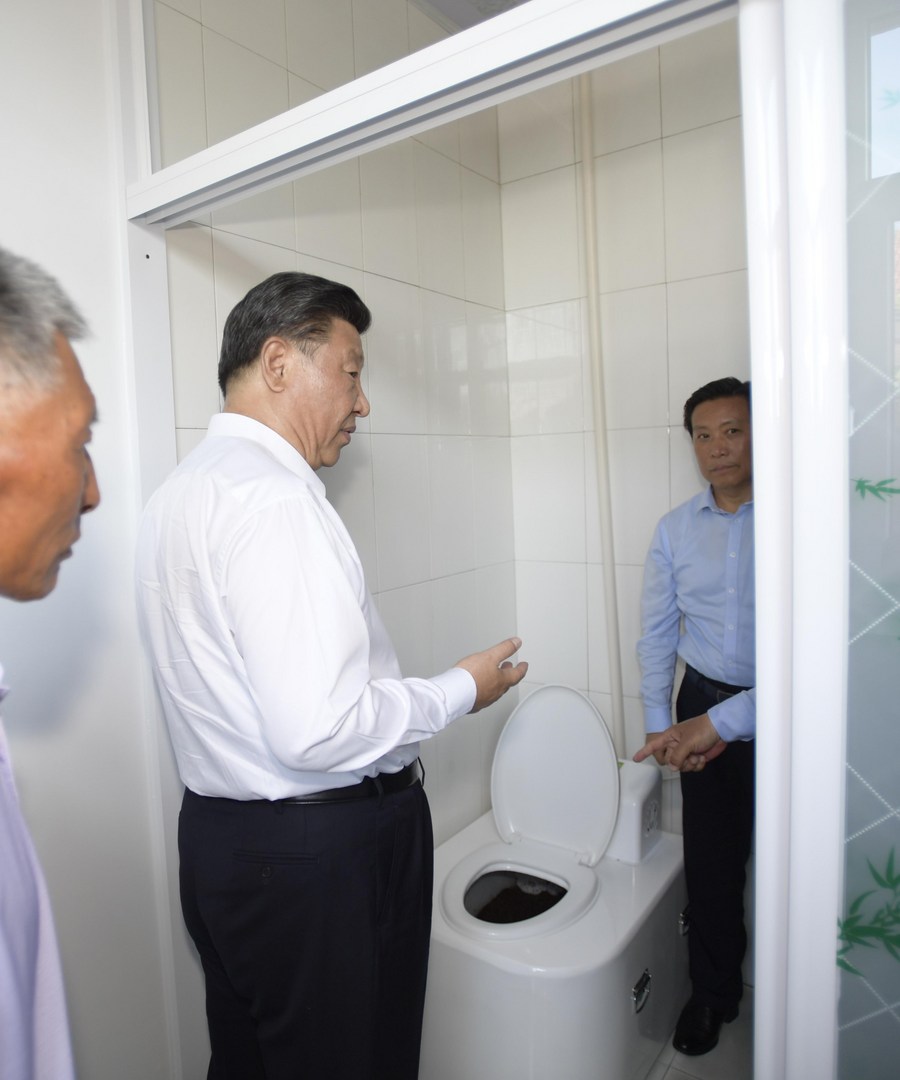
Xi Jinping visits Ma'anshan Village in Harqin Qi of Chifeng City, north China's Inner Mongolia Autonomous Region, July 15, 2019. [Photo/Xinhua]
Inner Mongolia, July 2019
During an inspection tour to north China's Inner Mongolia Autonomous Region, Xi visited the village of Ma'anshan, where people of several ethnic groups live together.
Xi said that the development of rural industries should focus on increasing the income of villagers and asked primary-level Party organizations in rural areas to be strengthened to better serve the rural people and agriculture.
At villager Zhang Guoli's home, Xi checked the courtyard, kitchen and toilet, and pledged to further improve the basic rural infrastructure and living environments.
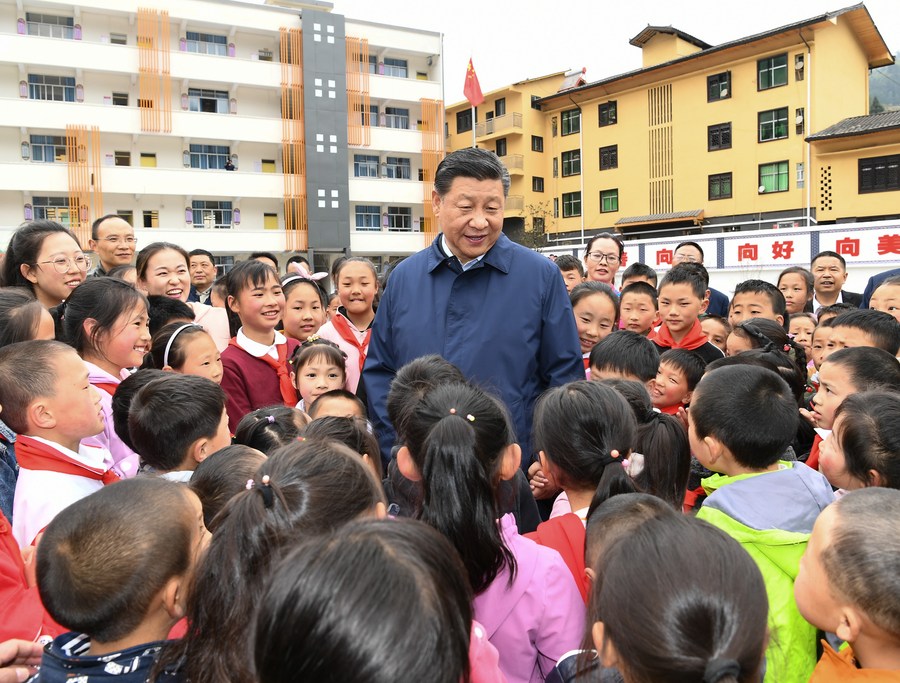
Chinese President Xi Jinping, also general secretary of the Communist Party of China Central Committee and chairman of the Central Military Commission, talks with students at a primary school in Zhongyi Township of Shizhu Tujia Autonomous County, southwest China's Chongqing, April 15, 2019. From April 15 to 17, Xi made an inspection tour to Chongqing. He also presided over and delivered a speech at a symposium to address the problems concerning the basic living needs of rural poor populations and their access to compulsory education, basic medical services, and safe housing. [Photo/Xinhua]
Chongqing, April 2019
During an inspection trip to southwest China's Chongqing Municipality, Xi visited a mountainous village in Shizhu Tujia Autonomous County.
While visiting a primary school there, Xi promised to ensure children in poor mountainous regions go to school and have a happy childhood.
Stopping by the house of Tan Dengzhou, an impoverished villager, Xi learned that Tan and his wife were unable to work due to illness and thus faced financial difficulties.
People who still live below the poverty line or slip back into poverty due to illness should be the priority of poverty-alleviation projects, Xi said, adding that they should receive support, such as minimum-living allowances, medical insurance and medical aid.
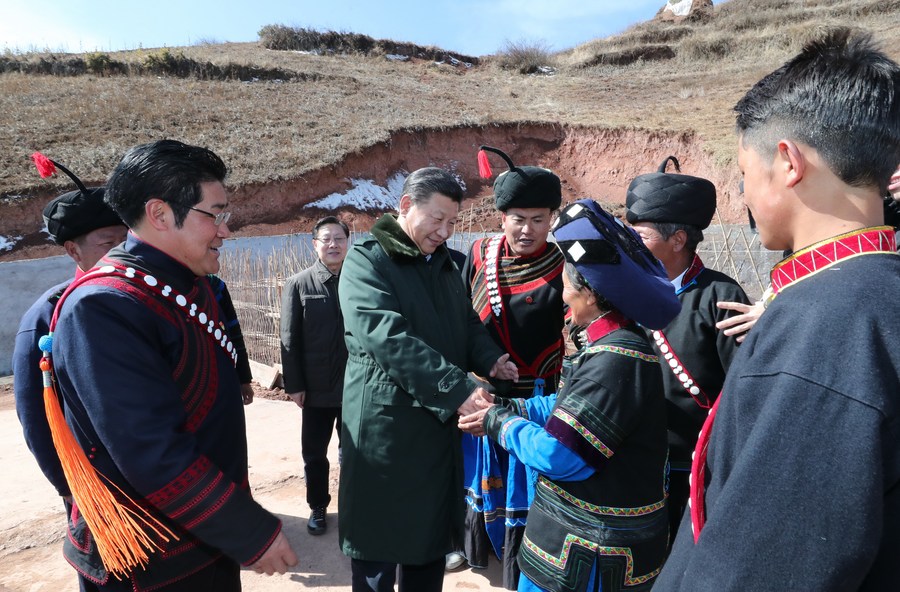
Chinese President Xi Jinping, also general secretary of the Communist Party of China Central Committee, listens to the poverty-alleviation work about relocation of residents from poor areas as he visits Huopu Village of Jiefang Township in Zhaojue County of Liangshan Yi Autonomous Prefecture, southwest China's Sichuan Province, Feb. 11, 2018. Xi made an inspection tour in Sichuan Province on Feb. 11. [Photo/Xinhua]
Sichuan, February 2018
Ahead of the Lunar New Year in 2018, Xi went to impoverished Liangshan Yi Autonomous Prefecture in southwest China's Sichuan Province.
Xi went to two ethnic Yi villages to visit poor families and was happy to learn that villagers have increased their incomes through raising cattle and growing potatoes, peppers and walnuts.
"Not a single ethnic group, family or person should be left behind," Xi said, adding that to build a moderately prosperous society in all respects, the most difficult task lies in regions with extreme poverty.

